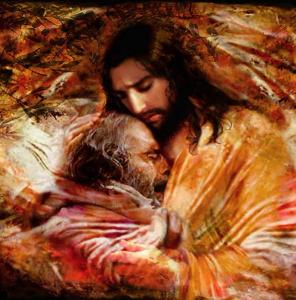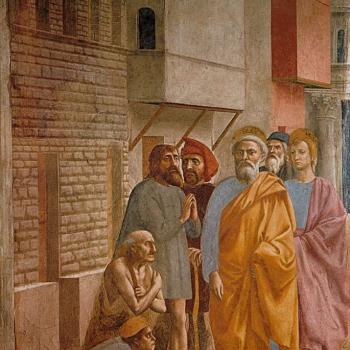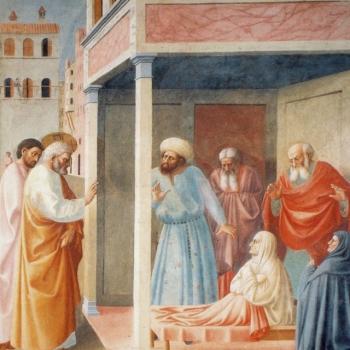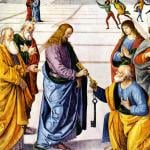“Please Hit ‘Subscribe’”! If you have received benefit from this or any of my other 4,600+ articles, please follow this blog by signing up (with your email address) on the sidebar to the right (you may have to scroll down a bit), above where there is an icon bar, “Sign Me Up!”: to receive notice when I post a new blog article. This is the equivalent of subscribing to a YouTube channel. Please also consider following me on Twitter / X and purchasing one or more of my 55 books. All of this helps me get more exposure, and (however little!) more income for my full-time apologetics work. Thanks so much and happy reading!
Johann Eck (1486-1543) was a German Catholic theologian, who was arguably one of Martin Luther’s two most important and formidable debate opponents, along with Erasmus (I’ve compiled several of his devastating replies to Luther as well). He was ordained as a priest in 1508 and in 1510 was installed as a professor of theology at the University of Ingolstadt in Bavaria: which lasted for thirty years. He mastered both Greek and Hebrew and had a prodigious memory, boundless energy, and very considerable debating skills. He famously engaged Luther for eighteen days in the Leipzig Disputation of July 1519.
Eck’s argumentation might be said to be one of the quintessential examples of the Catholic theological and polemical response to the Protestant Revolt up to the opening of the Council of Trent in 1545. This is one of many excerpts from his best-known and principal volume, Enchiridion of Commonplaces Against Luther and Other Enemies of the Church. It first appeared in 1529 and eventually went through 91 editions. I will be using a later edition from 1541 (translated by Ford Lewis Battles, Grand Rapids, Michigan: Baker Book House, 1979; now in the public domain).
Eck’s words will be in black; my interjections in blue, and citations from Luther and other famous Protestants in green. I use RSV for scriptural citations.
***
Axiom 1: After guilt has been forgiven through contrition and absolution, the penitent ought to make satisfaction for penalty.
Adam doubtless was repentant after guilt, yet at that point he was not threatened with a penalty by God. “In whatever day you shall eat of it, you shall die the death” [Gen 2:17]. Indeed after his transgression of the divine commandment, God added over and above the threatened penalty of death something else, saying to Adam: “Because you have hearkened to the voice of your wife and have eaten of the tree of which I commanded you that you should not eat, cursed is the earth in your work; with labor and toil shall you eat thereof all the days of your life. Thorns and thistles shall it bring forth to you; and you shall eat the herbs of the earth. In the sweat of your face shall you eat bread until you return to earth out of which you were taken, for dust you are, and into dust you shall return” [Gen 3:17-19].
“To the woman also he said: I will multiply your sorrow and your conception; in sorrow shall you bring forth children, and you shall be under your husband’s power,” [Gen 3:16] etc. And just as all of us have sinned in Adam so all of us die in him [cf Rom 5:12], also with the guilt of original sin, for which death and the other penalties were inflicted, remitted in baptism.
“David, after having committed adultery and murder, repentant, said to Nathan: ‘I have sinned against the Lord.’ And Nathan said to him: ‘The Lord also has put away your sin'” [2 K 12:13]. Now sin is put away, not in order to put away guilt, but for penalty. . . .
And there are many other examples, which point out and prove the same thing: Miriam, Moses’ sister, after her guilt in murmuring against Moses was forgiven, was stricken with leprosy; nor on that very spot when Moses prayed to the Lord for her that she might be healed, was she cleansed, but when the Lord commanded that for seven days, as a penalty for her sin, she be excluded from the camp, for that time the leprosy remained [Num 12:10-15].
God foretold that Moses and Aaron would not enter or lead the Israelite people into the promised land, on account of the sin of disbelief at the water of contradiction [Num 20:24] although doubtless this sin was forgiven these holy men. Joseph’s brothers confessed that they had justly suffered for their misdeed committed against their brother, “saying among themselves: We have deservedly suffered, because we have sinned against our brother,” etc. [Gen 42:21], Eli, because he reproved the sins of his sons less than he ought, “fell from his stool backwards and broke his neck, and died” [1 Kings 4:18]. David’s guilt, incurred by taking a census of the people, although forgiven him by the mercy of God for which he prayed, was attended by a very savage pestilence. He, being penitent, and commanded by the prophet, Gad, to make satisfaction, erected an altar and made an offering of fifty shekels [2 Sam 24:10ff; cf 1 Chr 21:7ff],
The Ninevites fasted and covered themselves with sackcloth, etc. [Jonah 3:5]. “Ahab . . . fasted, covered himself with goat’s hair, slept in sackcloth, walked with his head bowed down and placated the Lord” [1 K 21:27]. “If that nation shall repent of their evil, I also will repent of the evil that I have thought to do to them” [Jer 18:8].
According to the measure of the sin shall the measure also of the stripes be” [Deut 25:2].
“As much as she has glorified herself and lived in delicacies, so much torment and sorrow give to her” [Rev 18:7].
“Be not without fear about sin forgiven and say not: The mercy of the Lord is great, he will have mercy on the multitude of my sins” [Ecclus 5:5f].
Christ said to the cured paralytic who had been in his infirmity for thirty-eight years: “Behold, you have been made whole. Now sin no more, lest anything worse come upon you” [Jn 5:14]. In this Jesus manifestly hints that this infirmity lasting so many years was inflicted as a penalty for a sin long ago (something by no means incredible) wiped out through the patience of the infirm man and the mercy of God.
Axiom 2: Works of Satisfaction, pure prayer, fasting, alms, [and the restitution which is] enjoined upon the confessant, pertain to the sacrament of penance: these one manifestly comes upon from the Holy Scriptures.
In Leviticus [c. 4, 5, 6] the Lord commands various sacrifices to be offered for the various sins of priest, leader and people.
“Turn to me with your whole heart, in fasting and weeping” [Joel 2:12]. Daniel advised Nebuchadnezzar: “Make recompense for your sins with alms, and your iniquities with merciful acts toward the poor” [Dan 4:24].
The Ninevites repentant at the preaching of Jonah,” . . . putting on sackcloth, fasted together with their animals, and praying, cried out to the Lord . . . And God saw their works . . . and had mercy upon them” [Jonah 5:5, 10]. Our Savior Christ, praising them, prefers them to the unrepentant Jews, saying: “The men of Nineveh shall rise in the judgment with this generation, (that is, of those obstinate ones not making satisfaction for their sins) and shall condemn it, because they repented at the preaching of Jonah …” [Lk 11:32].
John the Baptist urged the people saying: “Bring forth fruits worthy of penance” [Lk 3:8]. Christ upbraided the cities in which very many miracles, were done because they had not repented: “Woe to you, Corozaim Woe to you Bethsaida, for if in Tyre and Sidon had been wrought the miracles that have been wrought in you they had long ago done penance in sackcloth and ashes” [Mt 11:21].
“Unless you do penance, you shall all likewise perish,” just as “those eighteen upon whom the tower fell in Siloe and killed them” [Lk 13:4f]. “In all things let us exhibit ourselves as the ministers of God, in much fasting,” etc. [2 Cor 6:4]. Therefore it is clear that satisfaction is truly necessary for the penitent. [This also is effectively proved by the same scriptures by which Luther in vain tries to disprove it.]
[Objection] John the Baptist, sent to preach repentance, taught only the observance of God’s commandments, saying: “Do nothing more than that which is appointed you” [Lk 3:13], making no mention of satisfaction.
*
[Reply] First of all we deny that John did not teach satisfaction. Surely he enjoined alms which pertain to satisfaction, saying, He who has two coats, let him give to him who has none and he who has food, let him do in like manner” [Lk 3:11]. Indeed those baptized by John confess their sins that according to the quality of the sins penance might be determined for them. Hence he taught, bring forth fruits worthy of penance which fruits arise through works of satisfaction. John did not preach mere repentance but a baptism of repentance, not his own, but of Christ for the remission of sins. Therefore he was not obligated to make more express mention of satisfaction to those baptized by him and those thereafter to be baptized by the baptism of Christ (in which at the same time both guilt and penalty are remitted).
[Objection] Micah says: “I will show you, 0 man, what is good, and what the Lord requires of you: Verily, to do judgment, and to love mercy, and to walk carefully with your God,” etc. [Mic 6:8]. And he corroborates this, because the Prophet here makes fun of those who wish to make satisfaction through works, saying: “What shall I offer to the Lord that is worthy? . . . Shall I offer holocausts unto him, and yearling calves? Can the Lord be appeased with thousands of rams, or with many thousands of he-goats?” etc. [Mic 6:6f] . As if he did not say this.
***
*
Practical Matters: Perhaps some of my 4,600+ free online articles (the most comprehensive “one-stop” Catholic apologetics site) or fifty-five books have helped you (by God’s grace) to decide to become Catholic or to return to the Church, or better understand some doctrines and why we believe them.
Or you may believe my work is worthy to support for the purpose of apologetics and evangelism in general. If so, please seriously consider a much-needed financial contribution. I’m always in need of more funds: especially monthly support. “The laborer is worthy of his wages” (1 Tim 5:18, NKJV). 1 December 2021 was my 20th anniversary as a full-time Catholic apologist, and February 2022 marked the 25th anniversary of my blog.
PayPal donations are the easiest: just send to my email address: [email protected]. Here’s also a second page to get to PayPal. You’ll see the term “Catholic Used Book Service”, which is my old side-business. To learn about the different methods of contributing (including Zelle), see my page: About Catholic Apologist Dave Armstrong / Donation Information. Thanks a million from the bottom of my heart!
*
***
*
Photo credit: painting on the “Reconciliation” page for St. Helena Catholic Church, Amite, Louisiana.
Summary: One of a series of posts documenting the Catholic apologetics efforts of Johann Eck (1486-1543) against various Protestants. This entry addresses satisfaction.


















